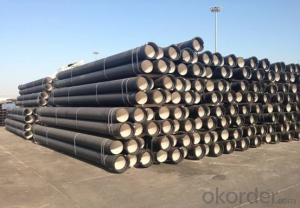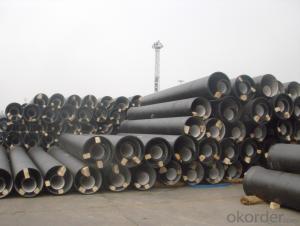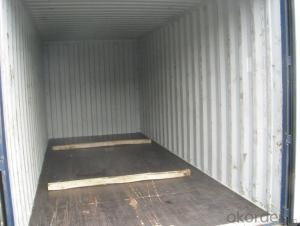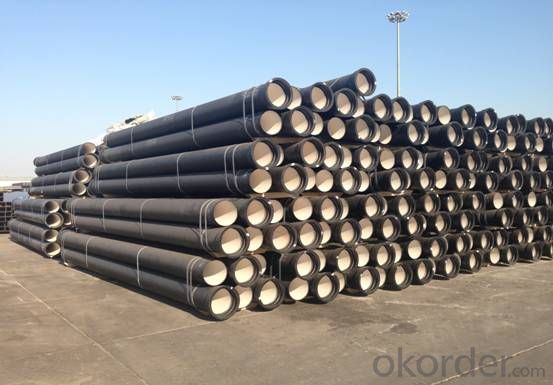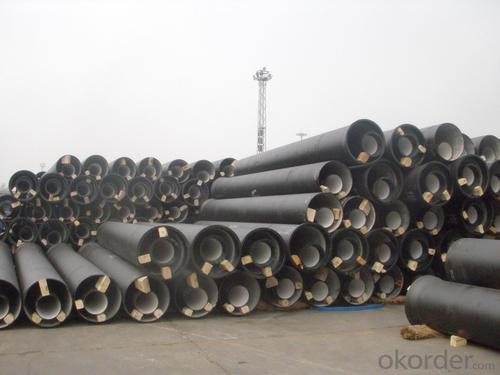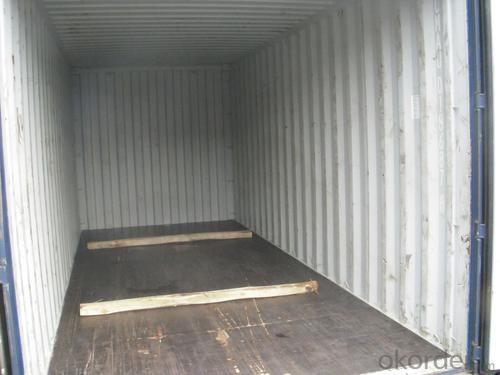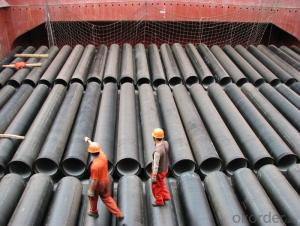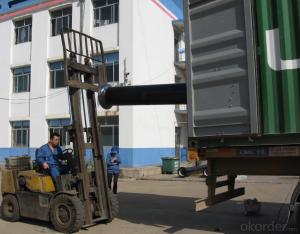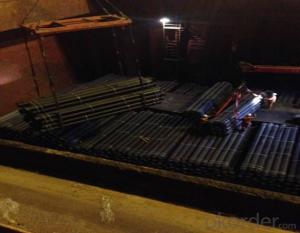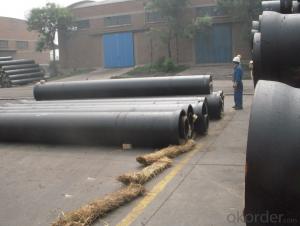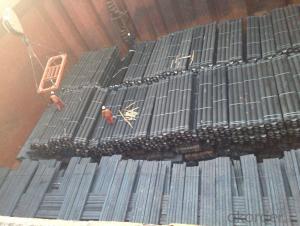DUCTILE IRON PIPES K8 DN125
- Loading Port:
- China Main Port
- Payment Terms:
- TT OR LC
- Min Order Qty:
- -
- Supply Capability:
- -
OKorder Service Pledge
OKorder Financial Service
You Might Also Like
Ductile Iron Cast Pipe is without any defects compare with tradition casting tech, which has many advantages particularly as follow:
(1) High density. In the "vertical upward casting" process, the melt iron of centre liquid column in center crystallizer is continuously feeding for volume shrinkage caused by condensation tube at outer circumference , which lead to be free of shrinkage porosity.
(2) High purity. When melt iron pouring, the mixed impurities such as gas, dross, sand grain which are lighter than melt iron could be eliminated at furnace mouth, its impossible to enter into the crystallizer through the channel, so the melt iron into the crystallizer is very pure.
(3) Strength with toughness. The cooling speed provided by continuous crystallizer is 30 times than sand casting and 5 times than centrifugal casting, and doesn't produce white iron, the eutectic cell volume of continuous cast iron is one eighth to one tenth compare with traditional cast iron. The density of graphite nodule in ductile iron can reach 300-700 pcs/mm2. Therefore, all reason above improve the strength and toughness of continuous cast iron.
(4) Free machining. The high speed cooling make the hardening phase (such as boride, steadite) not appear like reticular, massive or thick, but diffuse like fish bone and pane in shape, moreover, there are tiny graphite flakes inlaid hardening phase. It's free machining in BrinellHardness the range of 250-300HB. However, the Brinell Hardness of 250 is top limit to common metal materials.
(5) Uniform composition of tube wall. The convection mixing of liquid column caused by marching type drawing in crystallizer make the composition of tube wall well-distributed, and concentration gradient very little.
(6) High productivity. To the wall thickness of tube under 10mm, the speed of continuous casting is 1 meter/min, to the wall thickness of tube under 20mm, the speed of continuous casting is 0.5 meter/min, which is high efficiency that centrifugal or other casting tech couldn't reach.
- Q: What is the expected burst pressure of ductile iron pipes?
- The expected burst pressure of ductile iron pipes can vary depending on several factors such as the pipe's diameter, wall thickness, and the specific grade of ductile iron used. However, ductile iron pipes are typically designed and manufactured to withstand high pressure loads. On average, ductile iron pipes have an expected burst pressure ranging from 350 psi (pounds per square inch) to 700 psi. However, it is important to note that this is a general range, and the actual burst pressure can be higher or lower depending on the specific design and manufacturing standards followed. To determine the exact expected burst pressure for a particular ductile iron pipe, it is recommended to consult the manufacturer's specifications or relevant industry standards such as the American Water Works Association (AWWA) C150 or ISO 2531, which provide guidelines for ductile iron pipes and their performance under various conditions. Additionally, local building codes and regulations may also provide specific requirements for ductile iron pipe installations.
- Q: Are ductile iron pipes suitable for pressure reducing valve stations?
- Ductile iron pipes prove to be suitable for pressure reducing valve stations due to their strength and durability, making them an ideal choice for applications involving high pressure. Pressure reducing valve stations, which regulate and decrease the pressure of a fluid or gas in a pipeline system, can rely on ductile iron pipes to handle the exerted pressure, ensuring an efficient and reliable operation. Moreover, the excellent resistance to corrosion exhibited by ductile iron pipes is crucial in upholding the integrity of the pipeline system, thereby preventing leaks or failures. Overall, the necessary strength, durability, and corrosion resistance required for pressure reducing valve stations are provided by ductile iron pipes.
- Q: How do ductile iron pipes handle extreme temperatures?
- Ductile iron pipes, known also as cast iron pipes, possess the ability to effectively handle extreme temperatures. The material composition of ductile iron enables it to endure both high and low temperatures without experiencing significant damage or degradation. When exposed to high temperatures, ductile iron pipes demonstrate exceptional thermal resistance, rendering them suitable for applications involving the transportation of hot liquids or gases. The high melting point of ductile iron, ranging from 2060°C to 2200°C, guarantees that the pipes can withstand extreme heat without melting or distorting. Consequently, these pipes are ideal for utilization in industries such as oil and gas, steam distribution, and high-temperature water supply systems. Likewise, ductile iron pipes exhibit satisfactory performance in low-temperature environments. They possess a low coefficient of thermal expansion, thereby enabling them to endure the expansion and contraction that occurs during temperature fluctuations without cracking or fracturing. This quality makes them appropriate for use in cold climates or in applications involving the transportation of chilled liquids or gases. Furthermore, ductile iron pipes possess excellent thermal conductivity, allowing them to efficiently dissipate heat. This characteristic proves particularly significant in high-temperature applications where effective heat transfer is vital to prevent damage to the pipes or the materials being transported. In conclusion, ductile iron pipes effectively handle extreme temperatures due to their high melting point, low coefficient of thermal expansion, and exceptional thermal conductivity. These attributes establish them as a dependable choice for various applications involving extreme temperature conditions.
- Q: Are ductile iron pipes suitable for use in wastewater pumping stations?
- Yes, ductile iron pipes are suitable for use in wastewater pumping stations. Ductile iron has excellent strength and durability, making it resistant to corrosion and capable of withstanding high pressure and heavy loads. It also has good flexibility, which helps prevent cracking or breaking under ground movements. Additionally, ductile iron pipes have a smooth internal surface, reducing friction and improving the flow of wastewater. Overall, these pipes are a reliable and long-lasting choice for wastewater pumping stations.
- Q: Are ductile iron pipes suitable for pressure sewer systems?
- Ductile iron pipes, known for their high strength and durability, are a suitable option for pressure sewer systems. They have been widely used in various applications, including pressure sewer systems, due to their ability to withstand high pressure and provide a long-lasting solution for transporting sewage under pressure. One key advantage of ductile iron pipes is their excellent corrosion resistance, which is crucial in sewer systems where they are exposed to various chemicals and contaminants. These pipes are resistant to both internal and external corrosion, ensuring their durability and functionality over time. Moreover, ductile iron pipes have a smooth internal surface, minimizing friction and improving the flow capacity of the sewer system. This feature allows the pipes to handle the required flow rates and prevent blockages or backups. Additionally, ductile iron pipes are known for their ease of installation. They can be easily cut and joined using various methods, making them a convenient choice for pressure sewer systems. Overall, ductile iron pipes offer a reliable choice for pressure sewer systems, thanks to their high strength, corrosion resistance, smooth internal surface, and ease of installation.
- Q: What is the use of ductile iron?
- As far as the tonnage is concerned, the automotive industry is the second largest producer of ductile iron castings, with the largest number of them. Ductile iron is used in three main parts of automobiles: (1) power source, engine parts; (2) power transmission of a gear train, gears and bushings; (3) vehicle suspension, brakes and steering gear. The power source is subjected to continuous change of the crankshaft bending, torsion and shear load, and in its service life, to one billion cycles of car design engineers early in the 19152 years that the processing method for magnesium found in four years later, immediately consider the possibility of using ductile iron. Almost all crankshafts of Ford motor are made of this material. Most gasoline engines in the world are fitted with ductile iron crankshafts instead of forged steel crankshafts, which are considered a typical example of value engineering.
- Q: Can ductile iron pipes be used in gravity sewer systems?
- Ductile iron pipes find great utility in gravity sewer systems. Renowned for their robustness and durability, they are extensively employed in diverse applications, including sewer systems. Boasting exceptional corrosion resistance, they can withstand immense pressure and heavy burdens. Moreover, their flawlessly smooth interior surface curtails friction and enhances the transportation of waste and wastewater. Consequently, they emerge as an ideal option for gravity sewer systems, where the seamless flow of sewage hinges upon gravity to traverse the pipes.
- Q: Ductile iron pipe is how many years warranty
- Ductile iron pipe warranty is unlimited.
- Q: Are ductile iron pipes suitable for use in oil refineries?
- Yes, ductile iron pipes are suitable for use in oil refineries. Ductile iron is a type of cast iron that offers a unique combination of strength, durability, and flexibility, making it an excellent choice for various applications, including oil refineries. One of the key advantages of ductile iron pipes is their high tensile strength, allowing them to withstand the high pressure and stress commonly found in oil refining processes. This strength is crucial for the transportation of various fluids, including crude oil, refined petroleum products, and chemicals within the refinery. Additionally, ductile iron pipes have excellent corrosion resistance properties, making them highly resistant to the corrosive effects of oil, chemicals, and other substances typically present in oil refineries. This corrosion resistance ensures the longevity and reliability of the pipes, reducing the need for frequent maintenance and replacement. Furthermore, ductile iron pipes have exceptional ductility, which means they can absorb and withstand significant impacts and vibrations without fracturing or breaking. This quality is advantageous in oil refineries where there may be frequent movement or potential stressors due to machinery, equipment, or ground settlement. Moreover, ductile iron pipes have a smooth interior surface that reduces friction, allowing for efficient fluid flow and minimizing pressure loss. This characteristic is essential in oil refineries, as it helps optimize the transportation of fluids, ensuring a smooth and reliable production process. In conclusion, ductile iron pipes are suitable for use in oil refineries due to their high tensile strength, corrosion resistance, ductility, and smooth interior surface. These pipes provide a reliable and durable solution for transporting various fluids within the refinery, contributing to the efficient and safe operation of oil refining processes.
- Q: What is the typical lifespan of ductile iron pipes?
- The typical lifespan of ductile iron pipes can range from 75 to 100 years, depending on various factors such as the quality of the installation, maintenance practices, and the conditions in which the pipes are exposed to.
Send your message to us
DUCTILE IRON PIPES K8 DN125
- Loading Port:
- China Main Port
- Payment Terms:
- TT OR LC
- Min Order Qty:
- -
- Supply Capability:
- -
OKorder Service Pledge
OKorder Financial Service
Similar products
Hot products
Hot Searches
Related keywords
